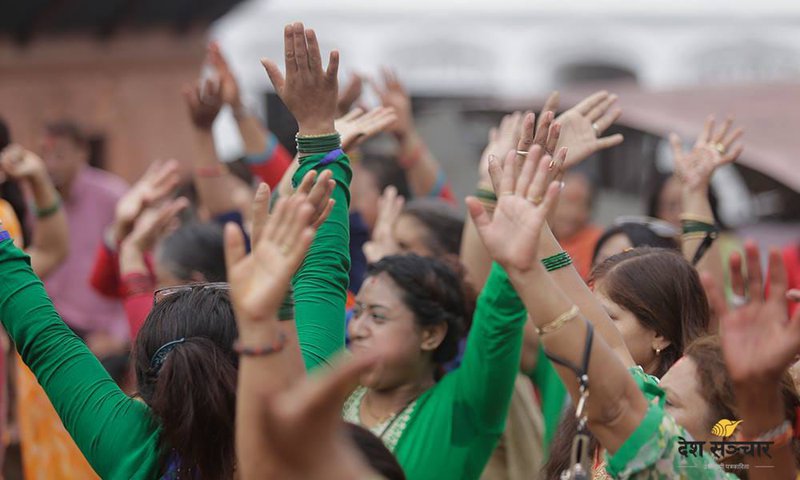
Along with tens of thousands of women Hinduu devotes, former Crown Prince Himani Shah also visited Pashupatinath Temple with her family members and offered Puja on auspicious day of Monday of Sharwan monts reports Deshsanchar.com.
From early morning, devotees are gathered all over Shiva Temples in Nepal including Pashupatinath temple.
According to Hindu literature, of all the months, Shravan Maas (July-August) is considered most auspicious. It is the fifth month of solar year and is also known as ‘Avani’ in the Tamil scriptures. As per Vedic astrology, when Sun enters the zodiac Leo, Shravan Maas is said to set in. As per lunar calendar, Shravan sets in on the New Moon Day.
On Full Moon Day (Punam or Purninma), the divine firmament (sky) is under the celestial sovereignty of Shravan Nakshtra (one of twenty seven Nakshatras). Therefore it is called Shravan. Each day during this month is auspicious for worshipping Shambhu (Shiva). Prayers and Vedic rituals are performed in Lord Shiva temples in order to please Him. Shravan Maas is also a holy month filled with other festivals such as Naga-Panchami, Govatsa, Shravani Purnima , Vara Lakshmi Vrata, Rishi Panchami, Raksha Bandhan, Kalkyavatara and Putradaikadashi.
Since it is the most auspicious period, one can take advantage of it by performing Shravan Maas Shiva Puja. During this month, the cosmos is super charged with Shiva tattvas (Shiva elements) that purify the mind, the senses, the body and the self (Soul) through the rituals dedicated to Lord Shiva. Following pujas can be performed under qualified Brahmins.
Significance of Shravan Maas
Devotees observe austerities, fasts and prayers in this holy month of Shravan. This is the time when Lord Shiva drank the poisonous Halahala that emanated from Samudra Manthan between the Devas and Asuras for the quest of the Nectar (ambrosia). During the Manthan, the ocean produced lots of valuables such as gemstones, Goddesses riches, cows, bows, the Moon, conch etc. which were taken up by gods and demons. Fourteen different gems emerged from the ocean which were divided them. When the Ocean produced the deadliest poison called Halahala, all of them cringed back as it was too dangerous to destroy the universes. It was Shiva who decided to drink it to save the world. His devout wife saw him taking Halahala, she at once held His throat so that the poison wouldn’t go down. As a result His throat turned blue and He was called Neelkantha.
Spiritual Activities During Shravan
One must engage in devotional activities such as worship, Sadhanas, meditaion or bhajans at home or in Shiva temples. One must visit Shiva temples during this month. Each day of this month carries spiritual significance. Monday is the day to worship Lord Shiva.
Tuesday: women worship Gauri for the better health of their family. Wednesday is dedicated to Vithala, an incarnation of Lord Vishnu or Krishna. Thursdays are for worshiping Buddh and Guru. Frida for worshiping Lakshmi and Tulsi. Saturdays are for Saturn (Shani Dev). These days are also known as Shravan Saturdays or Sampat Sanivara (wealth Saturdays) as one can pray for obtaining wealth.
Sundays:are for the Sun god. Sun worship was common practice in the Vedic period and it is followed even now. Especially in Shravan, every Sunday the Sun is worshipped. Things to do in Shravan Maas
Since Shravan Mass is highly auspicious as per Vedas, you can engage in activities that add to your devotion to Shiva.

Devotees at Pashupati Temple (Photo: Deshsanchar.com)
Rudra Abhishek And Homa:
Rudra’ means the one who is terribly infuriated, which is one of the divine qualities of Lord Shiva who displays it while performing His cosmic dance, Tandava for the annihilation of creations. Shiva, by the virtue of this quality, is called Rudra. Abhishek means a method of worship offered to the Divine for cleansing all the misgivings, sins of the worshiper.
Performing Shiva Abhishek includes the offerings of Panchamrit (mix of milk, honey, sugar, ghee and curd, Ganga jal, ghee, Bael Patra (Bilva leaves), Dhatura and other sacred items dear to Lord Shiva. Rudra Abhishek and Homa purifies your mind and body, offers peace, fulfills your desires and enlightens your soul.
Fasting For Shiva on Mondays during Shravan Maas:
According to Shiva Purana, those who observe fast during Shravan Maas have their desires fulfilled and are blessed with the grace of Shiva. Shravan Maas Somvar is very important for the devotees of Lord Shiva. There are two ways in which fast can be observed and they are:
Austere Fast:In this type of fasting, a person does not eat anything for an entire day except for drinking water. The fast is broken in the evening after sunset and regular food without onion and garlic is consumed.
Partial fast:In a partial fast one can eat fruits and permitted foods like sabudana and nuts in the day and eat one time meal in the night. The fast is broken after sunset, although in some cases it continues till next day.
(By astrologer .B.P.UPADHYAY
- Russia Industrialists Met Prime Minister Dahal
- Apr 24, 2024
- President Paudel Hosts Banquet In Honour Of Visiting Qatari Emir
- Apr 24, 2024
- Weather Forecast: Thunder Showers Is Likely At Few Places Of Koshi, Karnali And Sudur Pashchim
- Apr 24, 2024
- Japan Hands Over The Community Center For Disaster Prevention
- Apr 23, 2024
- Hanuman Jayanti 2024:Ritual And Significance
- Apr 23, 2024
















